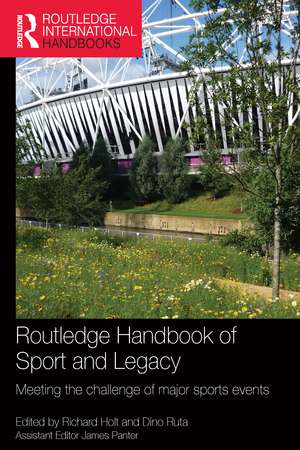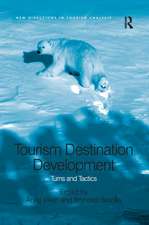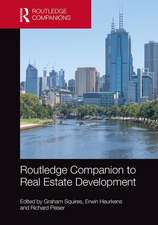Routledge Handbook of Sport and Legacy: Meeting the Challenge of Major Sports Events: Routledge International Handbooks
Editat de Richard Holt, Dino Rutaen Limba Engleză Paperback – 21 feb 2017
Major events must now have a conscious, credible and defined policy for legacy to meet public expectations. The book provides a comprehensive survey of the various kinds of legacy that can be delivered, as well as a close examination of the potential benefits and practical challenges involved in each. From ‘hard’ legacies, such as stadia and infrastructure, to ‘soft’ legacies including skill development, attitude change and capacity building, the book offers both a historical case study and an innovative strategic management approach, and establishes the limits of what can realistically be achieved in terms of economic, social, cultural, physical and sporting development.
The Routledge Handbook of Sport and Legacy includes contributions from world leading scholars and practitioners and features detailed case studies of major sports events from around the world, including the FIFA World Cup and ten Olympics Games from London in 1908 to London 2012. It is invaluable reading for students and researchers working in sport studies, events management, human geography, economics or planning, and an essential reference for any professional engaged in delivering legacy through sport.
| Toate formatele și edițiile | Preț | Express |
|---|---|---|
| Paperback (1) | 497.96 lei 6-8 săpt. | |
| Taylor & Francis – 21 feb 2017 | 497.96 lei 6-8 săpt. | |
| Hardback (1) | 1356.60 lei 6-8 săpt. | |
| Taylor & Francis – 24 feb 2015 | 1356.60 lei 6-8 săpt. |
Din seria Routledge International Handbooks
-
 Preț: 371.78 lei
Preț: 371.78 lei -
 Preț: 375.50 lei
Preț: 375.50 lei -
 Preț: 362.19 lei
Preț: 362.19 lei -
 Preț: 352.08 lei
Preț: 352.08 lei - 9%
 Preț: 1487.70 lei
Preț: 1487.70 lei - 5%
 Preț: 317.31 lei
Preț: 317.31 lei -
 Preț: 372.05 lei
Preț: 372.05 lei -
 Preț: 361.19 lei
Preț: 361.19 lei -
 Preț: 390.13 lei
Preț: 390.13 lei -
 Preț: 311.91 lei
Preț: 311.91 lei - 9%
 Preț: 1488.67 lei
Preț: 1488.67 lei -
 Preț: 390.22 lei
Preț: 390.22 lei -
 Preț: 347.74 lei
Preț: 347.74 lei -
 Preț: 347.74 lei
Preț: 347.74 lei - 9%
 Preț: 1490.11 lei
Preț: 1490.11 lei -
 Preț: 356.22 lei
Preț: 356.22 lei -
 Preț: 348.27 lei
Preț: 348.27 lei - 5%
 Preț: 328.11 lei
Preț: 328.11 lei -
 Preț: 394.24 lei
Preț: 394.24 lei - 8%
 Preț: 392.89 lei
Preț: 392.89 lei - 8%
 Preț: 422.42 lei
Preț: 422.42 lei -
 Preț: 357.22 lei
Preț: 357.22 lei - 8%
 Preț: 421.97 lei
Preț: 421.97 lei - 5%
 Preț: 452.16 lei
Preț: 452.16 lei -
 Preț: 341.55 lei
Preț: 341.55 lei - 9%
 Preț: 1651.61 lei
Preț: 1651.61 lei - 9%
 Preț: 1665.70 lei
Preț: 1665.70 lei -
 Preț: 381.91 lei
Preț: 381.91 lei -
 Preț: 350.20 lei
Preț: 350.20 lei -
 Preț: 347.74 lei
Preț: 347.74 lei - 20%
 Preț: 1401.00 lei
Preț: 1401.00 lei -
 Preț: 342.76 lei
Preț: 342.76 lei -
 Preț: 345.63 lei
Preț: 345.63 lei -
 Preț: 345.16 lei
Preț: 345.16 lei -
 Preț: 353.88 lei
Preț: 353.88 lei -
 Preț: 1057.72 lei
Preț: 1057.72 lei -
 Preț: 348.05 lei
Preț: 348.05 lei - 5%
 Preț: 337.33 lei
Preț: 337.33 lei -
 Preț: 365.90 lei
Preț: 365.90 lei - 9%
 Preț: 1528.86 lei
Preț: 1528.86 lei -
 Preț: 346.77 lei
Preț: 346.77 lei -
 Preț: 392.48 lei
Preț: 392.48 lei - 9%
 Preț: 1454.51 lei
Preț: 1454.51 lei - 5%
 Preț: 326.85 lei
Preț: 326.85 lei -
 Preț: 346.11 lei
Preț: 346.11 lei -
 Preț: 361.74 lei
Preț: 361.74 lei - 9%
 Preț: 1349.74 lei
Preț: 1349.74 lei - 19%
 Preț: 422.81 lei
Preț: 422.81 lei - 8%
 Preț: 385.56 lei
Preț: 385.56 lei
Preț: 497.96 lei
Nou
Puncte Express: 747
Preț estimativ în valută:
95.28€ • 99.48$ • 78.86£
95.28€ • 99.48$ • 78.86£
Carte tipărită la comandă
Livrare economică 04-18 aprilie
Preluare comenzi: 021 569.72.76
Specificații
ISBN-13: 9781138709560
ISBN-10: 1138709565
Pagini: 392
Ilustrații: 12 Line drawings, black and white; 4 Halftones, black and white; 32 Tables, black and white; 48 Illustrations, black and white
Dimensiuni: 174 x 246 x 37 mm
Greutate: 0.66 kg
Ediția:1
Editura: Taylor & Francis
Colecția Routledge
Seria Routledge International Handbooks
Locul publicării:Oxford, United Kingdom
ISBN-10: 1138709565
Pagini: 392
Ilustrații: 12 Line drawings, black and white; 4 Halftones, black and white; 32 Tables, black and white; 48 Illustrations, black and white
Dimensiuni: 174 x 246 x 37 mm
Greutate: 0.66 kg
Ediția:1
Editura: Taylor & Francis
Colecția Routledge
Seria Routledge International Handbooks
Locul publicării:Oxford, United Kingdom
Public țintă
Postgraduate and UndergraduateCuprins
Foreword: Legacy, the FIFA Perspective Introduction: Sport, Legacy and Leadership Preface: Reflections on legacy: Olympic cities and London 2012 Part 1: Planning and Governance of Legacy 1. A Strategic and Pluralistic approcach to legacy: the case of the Giro d’Italia 2. Economic legacy to cities of hosting mega sports events: a case study of Beijing 2008 3. The 1908 Olympic Games: a case study in accidental and incidental legacies 4. A stakeholder analysis of the governance of the 2010 FIFA World Cup – a case studyof the city of Cape Town 5. Vancouver 2010 Olympic Winter Games: Modes of Legacy Network Governance Part 2. Urbanisation and Legacy 6. Sydney Olympic Park 2000 to 2010: A Case Study of Legacy Implementation over the Longer Term 7. Croke Park as a historic venue: combining national legacy with multiple use 8. The Legacy of Memory: The Stockholm and Helsinki Olympic stadia as living memorials 9. The legacy of the 2004 Olympics for the Athens transport system 10. Framing the future: sustainability, legacy and the 2012 London Games Part 3: Social and Cultural Legacies 11. Paralympic Legacy: What Legacy? 12. A Lost Legacy of Fraternity? The case of European youth football 13. Cultural Olympiad or an Olympics for cultural regeneration? ‘Torino 2006’ and itslegacy 14. Major sporting events and long-lasting tourism impacts: 2006 FIFA World Cup in Germany 15. A socially responsible business legacy: Raising standards in procurement, supplychains and employment at the London Olympics of 2012 Part 4: Human Capital and Legacy 16. City Capacity Building: Preparing to Exploit the Legacy of a Large-Scale SportsEvent. The Case of Valencia and the 2007 America’s Cup 17. Transferring knowledge, know-how and capability: Managing and sharingknowledge for future events 18. From the first soccer Women's World Championship in 1991 to the Beijing Olympic Games in 2008: How capacity-building in small scale tournaments can help win Mega-event bids 19. Learning Disability Sport, Volunteers and Legacy: The Case of Special OlympicsGreat Britain National Games 2009 20. The Impact of the Olympics on the High Performance Legacy of a Host Country Part 5: The Politics and Image of Legacy 21. The political and diplomatic legacy of the Montréal Olympics 22. Media, Sport and Memory: the Mediated Legacies of Great Sporting Events 23. ‘Global visibility and prestige’: the anticipated legacies of mega sporting events in the Gulf States 24. Modern temples of marble and concrete: the legacy of the unsuccessful Olympic ambition of fascist Rome 25. The mixed legacy of Munich: The material, cultural and political consequences of the 1972 Olympic Games
Descriere
The Routledge Handbook of Sport and Legacy addresses perhaps the most important issue in the hosting of major contemporary sporting events: the problem of ‘legacy’. It offers a rigorous, innovative and comparative insight into this contested concept from interdisciplinary and practical perspectives. From ‘hard’ legacies, such as stadia and infrastructure, to ‘soft’ legacies including skill development, attitude change and capacity building, the book establishes the limits of what can realistically be achieved in terms of economic, social, cultural, physical and sporting development.
Including contributions from world leading scholars and practitioners and featuring detailed case studies of major sports events from around the world, this book is invaluable reading for students and researchers working in sport studies, events management, human geography, economics or planning, and an essential reference for any professional engaged in delivering legacy through sport.
Including contributions from world leading scholars and practitioners and featuring detailed case studies of major sports events from around the world, this book is invaluable reading for students and researchers working in sport studies, events management, human geography, economics or planning, and an essential reference for any professional engaged in delivering legacy through sport.





















